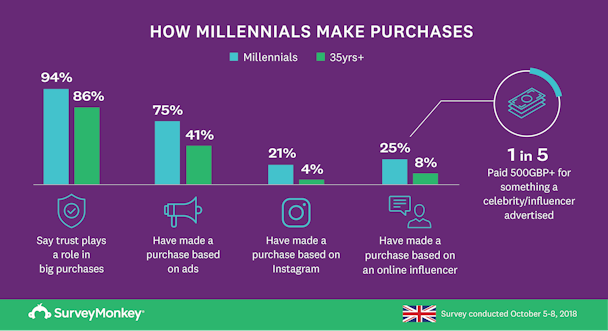SurveyMonkey data shows how brand trust influences millennials and over-35s differently
UK millennials believe they would be more likely swayed by influencer marketing than celebrity endorsement found a broad survey into how brand trust shapes consumer behaviour across two age groups from SurveyMonkey.

SurveyMonkey's consumer brand trust data
Revealed on stage during this year’s Web Summit in Lisbon, the report polled 1,010 adults aged above 18 from 5-7 October to map a gulf in attitudes between select age groups within the UK public.
The report found that UK millennials were more likely to be swayed by influencers. 21% have been swayed by a celebrity endorsement to make a purchase (compared to just 4% of those over 35). Meanwhile, 25% of millennials said they had purchased a product based on the recommendations of an influencer (compared to 8% over 35).
Across all age groups, a third of influencer/celebrity-influenced purchases clocked in at under £100, about half paid between £100-500. Moving up, one in five paid £500-999 and about one in 10 spent £1,000 or more.
The survey also mapped how audiences perceive they are influenced by select media channels.
Only three-quarters of UK millennials said they have bought goods because of an ad. A much smaller 41% of over 35s made the same concession. Across all age groups, TV ads clocked in as most effective (41%), followed by Facebook (31%), Instagram (21%) and other online ads (21%).
How the UK public engages with brands is also dependent on numerous trust-building factors. Brand history plays its part. (72%) of UK consumers would trust a spinoff brand as much as the original if it carried a memorable brand legacy. And then there was online visibility.
26% of the public said they have little trust in website-less brands, 17% have absolutely no trust. The absence of a social media account was more forgivable: only 6% say they have no trust at all, and 15% have very little trust.

Certain sectors benefit more from trust than others.
91% of consumers would prefer to purchase medical services from a trusted brand, 88% would prefer to purchase financial services from a trusted brand, and 80% would prefer to purchase consumer electronics from a well-established brand.
Diversity in advertising also cropped up in the study. Older people were less likely to claim they seek diversity in advertising. Fewer than 10% of over 35s think there is a lack of diversity in advertising (7%) and 6% said a lack of diversity in leadership (6%) would cause them to lose trust in a brand. Millennials clocked in at 19% and 15% respectively.
Offensive ads also land vastly differently with different segments.
Among the overall population, women are more likely than men to say offensive advertising would make them lose trust in a brand (36% compared to 24%).
43% of women found controversial ads less appealing than traditional ones, only a third of men felt the same. Young men were drawn to controversial creative, 28% of millennial males find controversial ads less appealing than traditional ones - and 34% find them more appealing.

Content created with:

SurveyMonkey
Founded in 1999, SurveyMonkey changed the way people gather feedback by making it easy for anyone to create their own online surveys. Today, SurveyMonkey’s mission...
Find out more
